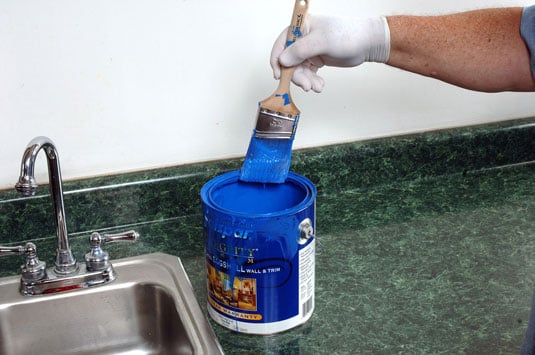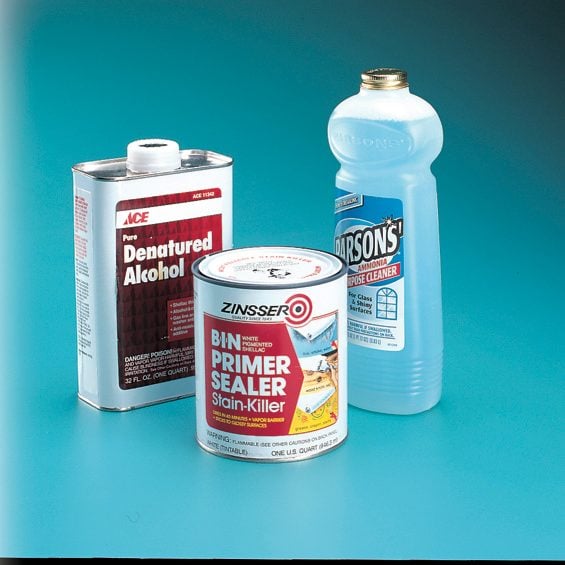The water-based cleaner on the right is only good for synthetic brushes. Both solvents will remove hardened latex and oil-based paint. The brushes must soak overnight (cover the container on the left with foil in a well-ventilated area). If the paint isn't softened after 24 hours, let the brushes soak another day. 44 bronze badges. Add a comment. Latex paint uses water as it's thinner. It's water soluble and won't dry as long as it's wet. If you wash your brushes and rollers with plenty of running water you should be fine. I clean mine with the sprayer and even then it takes quite a while to remove all of the paint. Use Solvents Alcohol is a famous cleaning agent that you can use to remove dry latex paint. Latex paint removers contain various types of solvents, but you can utilize the rubbing, denatured, or isopropyl alcohol for effective removal.
It’s a joy to live in the country, isn’t it? Um, except when you’ve just completed a painting project and it’s time for clean up.
Because the delicate balance of biological elements in your septic tank can be severely upset by paint, cleaning your brushes, rollers and even your hands in the sink is a no-no
Why Can’t I Do This?
Both latex- and oil-based paints have chemicals in them that won’t break down in your septic tank. Those chemicals will also “stress or destroy the biological treatment taking place” in your tank, according to the EPA.
What Could Happen?
Surface and ground water could become contaminated. Not good. Your septic tank could get seriously damaged and need replacement. Also not good.
What Should I Do Instead?
Sometimes it’s a toss up. If you use disposable paintbrushes and rollers, you’re adding to the landfill. But reusable eco-friendly painting supplies need to be cleaned before being used again.
Maybe you could take that stuff to your mom (who lives in the city, of course) and have her give it a good cleaning.
Or not.
Probably the best, and greenest, method is to cut back on the amount of clean up required. Squeeze every last drop from your paintbrush and roller tray. Use disposable liners for that tray. Try to get paint on the walls, instead of all over yourself.

The less clean up you need to do, the less hassle it is.
You may even need to think twice before repainting. Does it truly need to be done? Make a decision that’s environmentally responsible and still satisfies your redecorating tastes.
Smart Lighting Starts With the Switch
April 3, 2018The Ferno Grills Firewheel is a Revolution in Cooking
August 6, 2018A good paint project in the winter brightens up your home and makes everything fresh and clean. However, when you are finished with the fun stuff, you still must clean up your brushes, rollers, and paint-filled rinse water. Many people just pour all residue down the drain. This action can cause environmental issues and plumbing problems. For any paint left over, check with your local disposal methods for proper disposal of paint.
Cleaning Paint Brushes
- Make sure your paintbrush has all excess paint removed by scraping it against the inside rim of the paint can and work the remaining paint into a newspaper.
- Read the paint can and use the solvent suggested for cleaning. Latex paint can usually be cleaned with soap and water. Oil-based paints require stronger solvents.
- Immerse the brush in the appropriate solvent. Work the paint free of the bristles of the brush.
- When you believe the brush to be free of the paint, dip it into a pail of clean water to rinse.
- Wrap the paintbrush in heavy paper to help retain its shape.
Disposing of the Dirty Paint Water
When cleaning up from your winter painting project, here are the steps to clean and properly dispose of paint-filled water.
- Set the bucket of dirty paint rinse water to the side. A warm, dry climate works best.
- You can wait for the water to evaporate and the paint solids to settle on the bottom of the bucket. When the water evaporates, peel out the dried paint residue and dispose of the hardened paint in a trash bag with your other trash.
- Or, if you don’t want to wait for the water to evaporate, you can set the rinse water bucket to the side and allow the paint solids to settle on the bottom of the bucket. Then carefully tip the clear water at the top of the bucket onto a flat, grassy area that is away from sewer and storm drains, other waterways and wells. Then allow the liquids to dry to solid form and dispose of them in your trash bag.



Cleaning Latex Paint Brushes Septic Tank
Clean Latex Paint Brush In Sink
Paint solids from dirty paint rinse water over time will clog up your plumbing, damaging drains and piping. Making sure to dispose of your dirty paint water properly will save you time and money.
Cleaning Latex Paint From Brushes
Pouring dirty paint rinse water down your drains can cause build-up and plumbing issues.Already dumped your dirty paint water down the drain? Call the plumbing professionals at Estes Services. We will help you with any plumbing maintenance or crisis.
